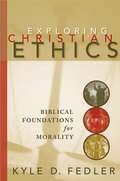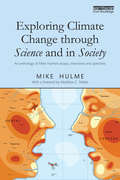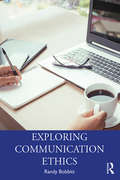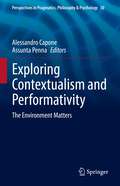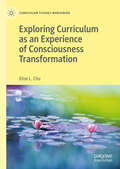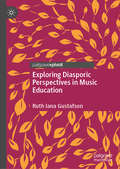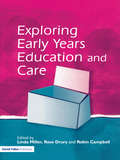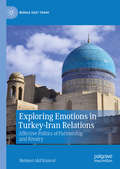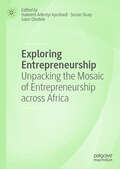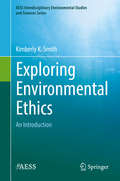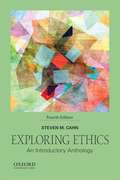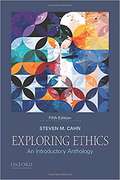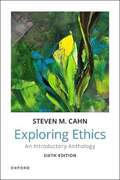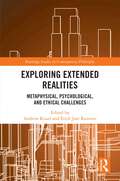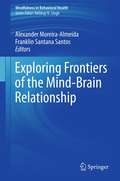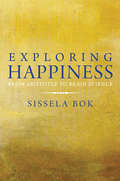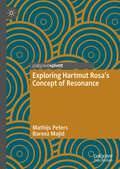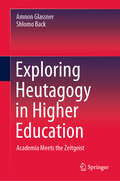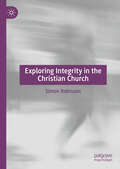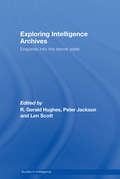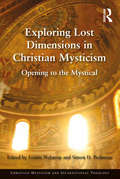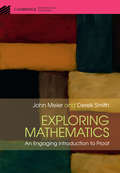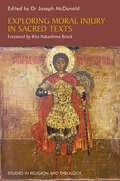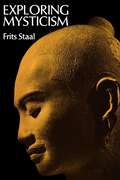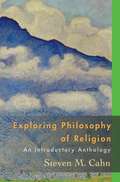- Table View
- List View
Exploring Christian Ethics: Biblical Foundations for Morality
by Kyle D. FedlerAdopting a unique appraoch among inroductions to Christian ethics, Kyle Fedler's Exploring Christian Ethics guides students through the moral decision-making process by providing foundational material in both ethical theory and biblical ethics. First, Fedler introduces the reader to the discipline of ethics, then he explores the ways Scripture can be used responsibly in Christian ethics, and finally, he presents and analyzes the sections of Scripture that have been most influential in Christian morality and ethics.
Exploring Climate Change through Science and in Society: An anthology of Mike Hulme's essays, interviews and speeches
by Mike HulmeMike Hulme has been studying climate change for over thirty years and is today one of the most distinctive and recognisable voices speaking internationally about climate change in the academy, in public and in the media. The argument that he has made powerfully over the last few years is that climate change has to be understood as much as an idea situated in different cultural contexts as it is as a physical phenomenon to be studied through universal scientific practices. Climate change at its core embraces both science and society, both knowledge and culture. Hulme’s numerous academic and popular writings have explored what this perspective means for the different ways climate change is studied, narrated, argued over and acted upon. Exploring Climate Change through Science and in Society gathers together for the first time a collection of his most popular, prominent and controversial articles, essays, speeches, interviews and reviews dating back to the late 1980s. The 50 or so short items are grouped together in seven themes - Science, Researching, Culture, Policy, Communicating, Controversy, Futures - and within each theme are arranged chronologically to reveal changing ideas, evidence and perspectives about climate change. Each themed section is preceded with a brief introduction, drawing out the main issues examined. Three substantive unpublished new essays have been specially written for the book, including one reflecting on the legacy of Climategate. Taken as a collection, these writings reveal the changes in scientific and public understandings of climate change since the late 1980s, as refracted through the mind and expression of one leading academic and public commentator. The collection shows the many different ways in which it is necessary to approach the idea of climate change to interpret and make sense of the divergent and discordant voices proclaiming it in the public sphere.
Exploring Communication Ethics: A Socratic Approach
by Randy BobbittExploring Communication Ethics is a comprehensive textbook on the ethical issues facing communication professionals in today&’s rapidly changing media environment. Empowering students to respond to real-world ethical dilemmas by drawing upon philosophical principles, historical background, and the ethical guidelines of major professional organizations, this book is designed to stimulate class discussion through real-world examples, case studies, and discussion problems. Students will learn how to mediate between the best interests of their employers and their responsibilities toward other parties, and to consider how economic, technological, and legal changes in their industries affect these ethical considerations. It can be used as a core textbook for undergraduate or graduate courses in communication or media ethics, and provides an ideal supplement for specialist classes in public relations, professional communication, advertising, political communication, or journalism and broadcast media.
Exploring Contextualism and Performativity: The Environment Matters (Perspectives in Pragmatics, Philosophy & Psychology #30)
by Alessandro Capone Assunta PennaThis edited volume on contextualism and pragmatics is interdisciplinary in character and contains contributions from linguistics, cognitive science and socio-pragmatics. Going beyond conventional contextual matters of truth-conditions and pragmatic intrusion, this text deals with a variety of issues including hyperbole, synonymy, reference, argumentation, schizophrenia, rationality, morality, silence and clinical pragmatics. Contributions also address the semantics/pragmatics debate and show to what extent the theory of contextualism can be applied. This volume is based on a unitary research project financed by the University of Messina and appeals to students and researchers working in linguistics and the philosophy of language.
Exploring Curriculum as an Experience of Consciousness Transformation (Curriculum Studies Worldwide)
by Elise L. ChuThis book addresses the issue of de-spiritualization in education through an interdisciplinary lens. It draws on curriculum scholarship of Dwayne Huebner, Martin Heidegger’s interpretation of Plato’s allegory of the cave, Buddhism, theories and philosophies of quantum physics, and philosophical hermeneutics, among others. In doing so, the author identifies the relationship between spiritual truth and education and probes the nature of consciousness, self, and reality. On this basis, she works to explore curriculum as an experience of consciousness transformation vital to the essence and purpose of education and argues for reason with faith and faith with reason as well as the imperative of curriculum imbued with spiritual wisdom and lived experiences.
Exploring Diasporic Perspectives in Music Education
by Ruth Iana GustafsonThis book challenges simplified claims of racial, national, and ethnic belonging in music education by presenting diaspora as a new paradigm for teaching music, departing from the standard multicultural guides and offering the idea of unfinished identities for musical creations. While multiculturalism—the term most commonly used in music education—had promised a theoretical framework that puts classical, folk, and popular music around the world on equal footing, it has perpetuated the values of Western aesthetics and their singular historical development. Breaking away from this standard, the book illuminates a diasporic web of music’s historical pathways, avoiding the fragmentation of music by categories of presumed origins whether racial, ethnic, or national.
Exploring Early Years Education and Care
by Linda Miller Rose Drury Robin CampbellThis textbook has been developed and written in response to the huge changes in the Early Years sector. It will encourage students to go beyond the basics, to explore and research issues in more depth, and to take a critical and reflective approach to their practice. The book takes full account of the curriculum framework and the Foundation Stage for early years; it also acknowledges the National Literacy Strategy and the National Numeracy Strategy. Exploring Issues in Early Years Education and Care enables readers to go beyond a basic, introductory level and introduces the key issues in early childhood education and care such as researching young children; the place of work in early childhood; reducing inequalities in child health; and comparative perspectives in early childhood literacy. Although rooted firmly in practice and with a UK focus, the text introduces controversial issues and takes a look beyond the UK. This book comes from the team that wrote the best-selling Looking at Early Years Education and Care. The contributors' wide range of backgrounds in early years health and education ensures that the text will meet the needs of students and tutors on many different early years and early primary courses, as well as reflective practitioners working in a range of Early Years settings.
Exploring Emotions in Turkey-Iran Relations: Affective Politics of Partnership and Rivalry (Middle East Today)
by Mehmet Akif KumralThis book explores emotional-affective implications of partnership and rivalry in Turkey-Iran relations. The main proposition of this research underlines the theoretical need to reconnect psycho-social conceptualizations of “emotionality,” “affectivity,” “normativity,” and “relationality.” By combining key theoretical findings, the book offers a holistic conceptual framework to better analyze emotional-affective configuration of relational rules and roles in trans-governmental neighborhood interactions. The empirical chapters look at four consecutive periods extending from the end of First World War (November 1918) to the resuscitation of US sanctions against Iran (November 2018). In each episode, global-regional contours and dyadic dynamics of Ankara-Tehran relationship are examined critically. The century-long history of emotional entanglements and affective arrangements exposes complex patterning of “feeling rules.” Two countervailing constellations still reign over relational narratives. While the 1514 Çaldıran war myth reproduces sectarian resentment and confrontational climate, the 1639 Kasr-ı Şirin peace story reconstructs secular sympathy and collaborative atmosphere in Turkish-Iranian affairs.
Exploring Entrepreneurship: Unpacking the Mosaic of Entrepreneurship across Africa
by Hakeem Adeniyi Ajonbadi Susan Sisay Seun OladeleThis book explores the recent trends and challenges facing entrepreneurship in Africa. It features several chapters that cut across various contexts, highlighting aspects of social entrepreneurship, faith-based entrepreneurship, entrepreneurial financing, equality, diversity, inclusion, digital and technological transformation and regulations and enabling ecosystems across African countries. The chapters will be underpinned by a critical approach to understanding the trends and challenges in African entrepreneurship, which goes beyond focusing on the business cases but considers the sensitivity of the national context. The authors have a wealth of professional and academic experience. They have taught in institutions around the world and between them have worked in several managerial and entrepreneurial positions.
Exploring Environmental Ethics: An Introduction (Aess Interdisciplinary Environmental Studies And Sciences Ser.)
by Kimberly K. SmithThis book is designed as a basic text for courses that are part of an interdisciplinary program in environmental studies. The intended reader is anyone who expects environmental stewardship to be an important part of his or her life, as a citizen, a policy maker, or an environmental management professional. In addition to discussing major issues in environmental ethics, it invites readers to think about how an ethicist's perspective differs from the perspectives encountered in other environmental studies courses. Additional topics covered include corporate social responsibility, ecological citizenship, property theory, and the concept of stewardship as a vocation.
Exploring Ethics: An Introductory Anthology
by Steven M. CahnThis text brings together a rich, balanced, and wide-ranging collection of over fifty readings on ethical theory and contemporary moral issues. The selections are organized into three parts, providing instructors with flexibility in designing and teaching a variety of ethics courses.
Exploring Ethics: An Introductory Anthology
by Steven M. CahnIn this remarkably accessible, concise, and engaging introduction to moral philosophy, Steven M. Cahn brings together a rich, balanced, and wide-ranging collection of fifty-two readings on ethical theory and contemporary moral issues. He has carefully edited all the articles to ensure that they will be exceptionally clear and understandable to undergraduate students. The selections are organized into three parts--Challenges to Morality, Moral Theories, and Moral Problems--providing instructors with flexibility in designing and teaching a variety of ethics courses. Each reading is followed by study questions. <p><p> The fifth edition features twelve new articles and unparalleled representation of women philosophers, with nearly half of the essays authored or coauthored by women. A password-protected Instructor's Manual is available on the book's Ancillary Resource Center. Visit the book's free, open-access Companion Website for additional student and instructor resources.
Exploring Ethics: An Introductory Anthology
by Steven M. CahnIn this remarkably accessible, concise, and engaging introduction to moral philosophy, Steven M. Cahn brings together a rich, balanced, and wide-ranging collection of fifty-two readings on ethical theory and contemporary moral issues. He has carefully edited all the articles to ensure that they will be exceptionally clear and understandable to undergraduate students. The selections are organized into three parts--Challenges to Morality, Moral Theories, and Moral Problems--providing instructors with flexibility in designing and teaching a variety of ethics courses. Each reading is followed by study questions.
Exploring Extended Realities: Metaphysical, Psychological, and Ethical Challenges (Routledge Studies in Contemporary Philosophy)
by Andrew Kissel Erick José RamirezThis volume highlights interdisciplinary research on the ethical, metaphysical, and experimental dimensions of extended reality technologies, including virtual and augmented realities. It explores themes connected to the nature of virtual objects, the value of virtual experiences and relationships, experimental ethics, moral psychology in the metaverse, and game/simulation design. Extended Reality (XR) refers to a family of technologies aiming to augment (AR) or virtually replace (VR) human experience. The chapters in this volume represent cutting-edge research on XR experiences from a wide range of approaches including philosophy, psychology, Africana studies, and the cognitive sciences. They are organized around three guiding questions. Part 1, "What is Extended Reality?", contains a series of chapters examining metaphysical questions about virtual objects, actions, and worlds. Part 2, "Is There an Ethics for Extended Realities?", includes chapters that address ethical questions that arise within XR experiences. Finally, Part 3, "What Can We Do with Extended Realities?", features chapters from a diverse group of social scientists on the potential uses of XR as an investigative and educational tool, including its strengths and pitfalls. Exploring Extended Realities will appeal to scholars and advanced students working in philosophy of technology, metaphysics, moral psychology, applied ethics, and game studies.
Exploring Frontiers of the Mind-Brain Relationship
by Alexander Moreira-Almeida Franklin Santana SantosThe conscious mind defines human existence. Many consider the brain as a computer, and they attempt to explain consciousness as emerging at a critical, but unspecified, threshold level of complex computation among neurons. The brain-as-computer model, however, fails to account for phenomenal experience and portrays consciousness as an impotent, after-the-fact epiphenomenon lacking causal power. And the brain-as-computer concept precludes even the remotest possibility of spirituality. As described throughout the history of humankind, seemingly spiritual mental phenomena including transcendent states, near-death and out-of-body experiences, and past-life memories have in recent years been well documented and treated scientifically. In addition, the brain-as-computer approach has been challenged by advocates of quantum brain biology, who are possibly able to explain, scientifically, nonlocal, seemingly spiritual mental states. Exploring Frontiers of the Mind-Brain Relationship argues against the purely physical analysis of consciousness and for a balanced psychobiological approach. This thought-provoking volume bridges philosophy of mind with science of mind to look empirically at transcendent phenomena, such as mystic states, near-death experiences and past-life memories, that have confounded scientists for decades. Representing disciplines ranging from philosophy and history to neuroimaging and physics, and boasting a panel of expert scientists and physicians, including Andrew Newberg, Peter Fenwick, Stuart Hameroff, Mario Beauregard, Deepak Chopra, and Chris Clarke the book rigorously follows several lines of inquiry into mind-brain controversies, challenging readers to form their own conclusions--or reconsider previous ones. Key coverage includes: Objections to reductionistic materialism from the philosophical and the scientific tradition.Phenomena and the mind-brain problem.The neurobiological correlates of meditation and mindfulness.The quantum soul, a view from physics.Clinical implications of end-of-life experiences.Mediumistic experience and the mind-brain relationship. Exploring Frontiers of the Mind-Brain Relationship is essential reading for researchers and clinicians across many disciplines, including cognitive psychology, personality and social psychology, the neurosciences, neuropsychiatry, palliative care, philosophy, and quantum physics. "This book ... brings together some precious observations about the fundamental mystery of the nature of consciousness ... It raises many questions that serve to invite each of us to be more aware of the uncertainty of our preconceptions about consciousness ... This book on the frontiers of mind-body relationships is a scholarly embodiment of creative and open-minded science." C. Robert Cloninger, MD Wallace Renard Professor of Psychiatry, Genetics, and Psychology, Washington University School of Medicine St. Louis MO
Exploring Happiness: From Aristotle to Brain Science
by Sissela BokFrom the acclaimed author of Lying, a brilliant exploration of happiness set in the context of the world’s great philosophers, leaders, writers, and artists In this smart and timely book, the distinguished moral philosopher Sissela Bok ponders the nature of happiness and its place in philosophical thinking and writing throughout the ages. With nuance and elegance, Bok explores notions of happiness—from Greek philosophers to Desmond Tutu, Charles Darwin, Iris Murdoch, and the Dalai Lama—as well as the latest theories advanced by psychologists, economists, geneticists, and neuroscientists. Eschewing abstract theorizing, Bok weaves in a wealth of firsthand observations about happiness from ordinary people as well as renowned figures. This may well be the most complete picture of happiness yet.This book is also a clarion call to think clearly and sensitively about happiness. Bringing together very different disciplines provides Bok with a unique opportunity to consider the role of happiness in wider questions of how we should lead our lives and treat one another—concerns that don’t often figure in today’s happiness equation. How should we pursue, weigh, value, or limit our own happiness, or that of others, now and in the future? Compelling and perceptive, Exploring Happiness shines a welcome new light on the heart of the human condition.
Exploring Hartmut Rosa's Concept of Resonance
by Mathijs Peters Bareez MajidThis book makes a compelling case for utilising experiences of resonance in various academic and societal fields. The concept of resonance was first introduced by Hartmut Rosa to foreground the importance of affective, emotional, transformative and uncontrollable experiences in socio-political contexts that he characterizes as alienating. Based on a critical reading of Rosa’s theory and further developed through engagement with Theodor W. Adorno, Gilles Deleuze, Hannah Arendt, Judith Butler and others, this book introduces the notion of a ‘spectrum of resonance’ which encompasses both critical resonance and affirmationist resonance. This spectrum of resonance is used to analyse various forms of aesthetic experience illustrated with reference to Edgar Reitz’s film Heimat and the music of Nick Cave and Kayhan Kalhor. The spectrum is also deployed in the fields of museum, memory and trauma studies to show how experiences of resonance contribute to the constitution of political and social identities. The focus here is on memory practices in the Kurdistan Region of Iraq and the book seeks to decolonize resonance theory.
Exploring Heutagogy in Higher Education: Academia Meets the Zeitgeist
by Amnon Glassner Shlomo BackThis book explores heutagogy (self-determined learning) - a new approach to teaching and learning in higher education - and proposes a paradigm shift in teaching, learning, and the educational enterprise and ecosystem.The first part of the book presents the philosophical, psychological and sociological foundations of heutagogy, and describes lessons learned from prior experiences of its implementation. The second part presents a collaborative self-study of five heutagogy courses in higher education. The third discusses how the academic community can enhance the paradigm change, and compares heutagogy to similar academic approaches. The concluding chapter of the book explores the question of “what next”? and suggests some possible elaborations of heutagogy.“At the beginning, it was very difficult for me to appreciate the course’s mode of learning. All my life I had learned in a traditional manner. Occasionally I felt that I was being thrown into deep water without a lifeguard. … But as the course progressed, I succeeded in letting go of my deeply rooted habits and discovered a new learning approach, through which I found in myself a new learner…” (Student’s reflection)“...this book suggests a novel approach to learning and education and will become a widely read one.” Dr. Lisa Marie Blaschke, Carl von Ossietzky University of Oldenburg
Exploring Integrity in the Christian Church
by Simon RobinsonThis book presents a philosophical and theological analysis of the concept of integrity. Using case studies, it offers a view of integrity which is focused in: identity (individual and corporate); responsibility (for critical reflection on identity and related ideas and feelings associated with worth, mutual and plural accountability, and shared responsibility for creating and creation); ongoing learning (individual and corporate). Simon Robinson brings together Aristotelian and existentialist perspectives, agapeic theology, and wider leadership and governance theory, and in doing so connects ecclesiology, Christian Ethics, pastoral theology, church leadership and governance. Robinson focuses on praxis, reflection on how the Christian church engages its members and the world, and how it can learn and develop peacebuilding. Critical to this the development of genuine dialogue, individual and shared narrative building, and the corporate framework of virtues and virtue development, which connects individual and corporate agency.
Exploring Intelligence Archives: Enquiries into the Secret State (Studies in Intelligence)
by Peter Jackson Len Scott R. Gerald HughesThis edited volume brings together many of the world's leading scholars of intelligence with a number of former senior practitioners to facilitate a wide-ranging dialogue on the central challenges confronting students of intelligence. The book presents a series of documents, nearly all of which are published here for the first time, accompanied by both overview and commentary sections. The central objectives of this collection are twofold. First, it seeks to build on existing scholarship on intelligence in deepening our understanding of its impact on a series of key events in the international history of the past century. Further, it aims to explore the different ways in which intelligence can be studied by bringing together both scholarly and practical expertise to examine a range of primary material relevant to the history of intelligence since the early twentieth century. This book will be of great interest to students of intelligence, strategic and security studies, foreign policy and international history.
Exploring Lost Dimensions in Christian Mysticism: Opening to the Mystical (Contemporary Theological Explorations in Mysticism)
by Simon D. Podmore Louise Nelstrop’Mystical theology’ has developed through a range of meanings, from the hidden dimensions of divine significance in the community’s interpretation of its scriptures to the much later ’science’ of the soul’s ascent into communion with God. The thinkers and questions addressed in this book draws us into the heart of a complicated, beautiful, and often tantalisingly unfinished conversation, continuing over centuries and often brushing allusively into parallel concerns in other religions. Raising fundamental matters of epistemology, representation, metaphysics, and divine reality, contributors approach the mystical from postmodern, feminist, sociological and historical perspectives through thinkers such as Meister Eckhart, Thomas Aquinas, Catherine of Siena, Ignatius of Loyola, William James, Evelyn Underhill, Ernst Troeltsch, Rudolf Otto, Jacques Derrida, Jean-Luc Marion and Jean-Louis Chrétien. Medieval and early modern radical prophetic approaches are also explored. This book includes new essays by Sarah Apetrei, Tina Beattie, Raphel Cadenhead, Oliver Davies, Philip Endean, Brian FitzGerald, Ann Loades, George Pattison, Simon D. Podmore, Joel D.S. Rasmussen, and Johannes Zachhuber.
Exploring Mathematics: An Engaging Introduction to Proof (Cambridge Mathematical Textbooks)
by John Meier Derek SmithExploring Mathematics gives students experience with doing mathematics - interrogating mathematical claims, exploring definitions, forming conjectures, attempting proofs, and presenting results - and engages them with examples, exercises, and projects that pique their interest. Written with a minimal number of pre-requisites, this text can be used by college students in their first and second years of study, and by independent readers who want an accessible introduction to theoretical mathematics. Core topics include proof techniques, sets, functions, relations, and cardinality, with selected additional topics that provide many possibilities for further exploration. With a problem-based approach to investigating the material, students develop interesting examples and theorems through numerous exercises and projects. In-text exercises, with complete solutions or robust hints included in an appendix, help students explore and master the topics being presented. The end-of-chapter exercises and projects provide students with opportunities to confirm their understanding of core material, learn new concepts, and develop mathematical creativity.
Exploring Moral Injury in Sacred Texts
by John Thompson Warren Carter Rita Nakashima Brock Amir Hussain Brad Kelle Daniel C. Maguire David R. Blumenthal Joseph Mcdonald Kelly Denton-Borhaug Michael Yandell Nancy BowenMoral injury is a profound violation of a human being's core moral identity through experiences of violence or trauma. This is the first book in which scholars from different faith and academic backgrounds consider the concept of moral injury not merely from a pastoral or philosophical point of view but through critical engagement with the sacred texts of Judaism, Christianity, Islam, Buddhism and American Civil Religion. This collection of essays explores the ambiguities of personal culpability among both perpetrators and victims of violence and the suffering involved in accepting personal agency in trauma. Contributors provide fresh and compelling readings of texts from different faith traditions and use their findings to reflect on real-life strategies for recovery from violations of core moral beliefs and their consequences such as shame, depression and addiction. With interpretations of the sacred texts, contributors reflect on the concerns of the morally-injured today and offer particular aspects of healing from their communities as support, making this a groundbreaking contribution to the study of moral injury and trauma.
Exploring Mysticism: A Methodological Essay (Center for South and Southeast Asia Studies, UC Berkeley #22)
by Frits StaalUntil less than a century ago, the two prevailing views of dreams as well as of souls were that they are inconsequential (the scientific view) or of divine origin (the religious view). In either case it was assumed that they cannot be objects of rational inquiry. Similar views still prevail regarding mystical experiences and mysticism in general. Modern Western opinion, whether friendly or hostile, holds that the mystical falls squarely within the domain of the irrational. Mr. Staal argues that mysticism can be studied rationally, and that without such study no theory of mind is complete. He exposes the grounds for the belief that mysticism cannot be studied, and shows them to be prejudices issuing from a particular historical development. While his contention has unflattering implications for the contemporary study of the humanities in general, it reveals in particular that existing academic approaches to the study of mysticism, even those that appear sound, are in fact inadequate. This conclusion applies to a variety of dogmatic inquiries and, as becomes clear in these pages, to philological, historical, phenomenological, sociological, physiological, and psychological ones as well.The illustrations in Exploring Mysticism are drawn mainly from Indian forms of mysticism such as Yoga, supplemented with Buddhist, Taoist, Muslim and Christian examples.
Exploring Philosophy of Religion: An Introductory Anthology
by Steven M. CahnWhat are the inherent claims that lie at the core of religion? Which of them are defensible by reason, and which are not? Potential answers to these questions and more, from influential philosophers past and present, may be found in this short book edited by Steven M. Cahn. Featuring fifty-two classic and contemporary readings, Exploring Philosophy of Religion: Text and Readings is a topically-organized anthology that presents broad coverage of seven major areas in the philosophy of religion - the concept of God, the existence of God, religious language, miracles and mysticism, belief in God, resurrection and immortality, and religious pluralism - in a clear and accessible format. With guiding introductory material from Professor Cahn, each of the readings has been carefully selected and edited for maximum clarity and comprehensiveness; only the most essential material is included. To further foster understanding, the text also features an appendix consisting of Professor Cahn's monograph, God, Reason, and Religion, which provides a synthesis and interpretation of the crucial issues raised throughout the readings.
